八年级下册英语语法笔记
八年级下册英语语法知识点归纳总结
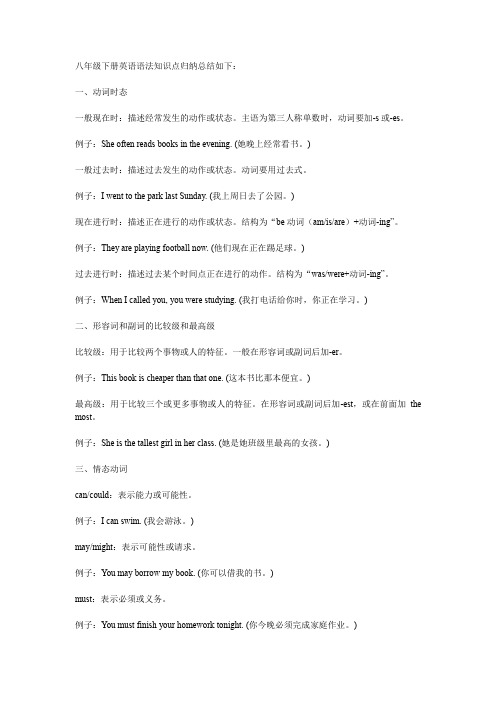
八年级下册英语语法知识点归纳总结如下:一、动词时态一般现在时:描述经常发生的动作或状态。
主语为第三人称单数时,动词要加-s或-es。
例子:She often reads books in the evening. (她晚上经常看书。
)一般过去时:描述过去发生的动作或状态。
动词要用过去式。
例子:I went to the park last Sunday. (我上周日去了公园。
)现在进行时:描述正在进行的动作或状态。
结构为“be动词(am/is/are)+动词-ing”。
例子:They are playing football now. (他们现在正在踢足球。
)过去进行时:描述过去某个时间点正在进行的动作。
结构为“was/were+动词-ing”。
例子:When I called you, you were studying. (我打电话给你时,你正在学习。
)二、形容词和副词的比较级和最高级比较级:用于比较两个事物或人的特征。
一般在形容词或副词后加-er。
例子:This book is cheaper than that one. (这本书比那本便宜。
)最高级:用于比较三个或更多事物或人的特征。
在形容词或副词后加-est,或在前面加the most。
例子:She is the tallest girl in her class. (她是她班级里最高的女孩。
)三、情态动词can/could:表示能力或可能性。
例子:I can swim. (我会游泳。
)may/might:表示可能性或请求。
例子:You may borrow my book. (你可以借我的书。
)must:表示必须或义务。
例子:You must finish your homework tonight. (你今晚必须完成家庭作业。
)四、被动语态被动语态用于描述事物的状态或描述被动发生的动作。
结构为“be动词(am/is/are/was/were)+动词的过去分词”。
八年级下册人教版英语笔记

八年级下册人教版英语笔记一、Unit 1 What's the matter?1. 重点单词。
- matter:n. 问题;事情。
常用搭配:What's the matter (with sb.)? = What's wrong (with sb.)? = What's the trouble (with sb.)?(某人)怎么了?- sore:adj. 疼痛的;酸痛的。
例如:a sore throat喉咙痛。
- stomachache:n. 胃痛;腹痛。
- foot:n. 脚;足。
复数形式是feet。
- neck:n. 脖子;颈部。
- fever:n. 发烧。
have a fever发烧。
- lie:v. (lay - lain)躺;平躺。
lie down躺下。
- rest:v. & n. 放松;休息。
take breaks/take a break = have a rest休息。
- cough:v. & n. 咳嗽。
have a cough咳嗽。
- toothache:n. 牙痛。
2. 重点短语。
- have a cold:感冒。
- have a stomachache:胃痛。
- lie down and rest:躺下休息。
- drink some hot tea with honey:喝些加蜂蜜的热茶。
- see a dentist:看牙医。
- get an X - ray:拍X光片。
- take one's temperature:量体温。
3. 重点句型。
- What should I do? 我应该做什么?- You should see a dentist and get an X - ray. 你应该去看牙医并拍X光片。
- Should I put some medicine on it? 我应该在上面敷些药吗?- Yes, you should. / No, you shouldn't. 是的,你应该。
英语八下人教版重点语法

英语八下人教版重点语法
英语八下人教版的重点语法包括:
1.过去完成时(Past Perfect Tense):用来表示在过去某个时间或动作之前已经发生或完成的动作。
例如:I had already
finished my homework before my mom came back.
2.时间状语从句(Time clauses):用来表示时间关系的从句,一般以when,as soon as,until,before,after等引导。
例如:We will go to the park when it stops raining.
3.条件状语从句(Conditional clauses):用来表示假设条件的从句,一般以if引导。
例如:If it rains tomorrow, we will stay at home.
4.动词不定式(Infinitives):用来表示目的、原因、建议等。
例如:I went to the store to buy some groceries.
5.被动语态(Passive voice):用来强调动作的承受者而不是执行者。
例如:The cake was made by my mom.
6.定语从句(Relative clauses):用来修饰名词或代词的从句,一般由关系代词who,which,that引导。
例如:The boy who won
the competition is my neighbor.
这些语法结构在英语八下人教版教材中经常出现,需要学生掌握
和应用。
希望以上回答能对您有帮助。
八下英语笔记
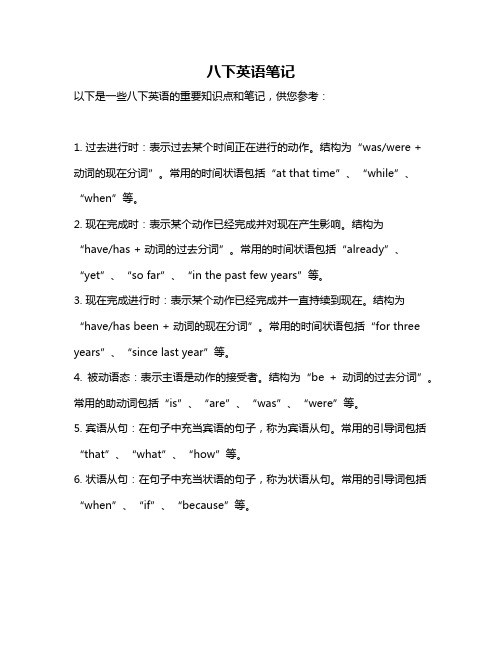
八下英语笔记以下是一些八下英语的重要知识点和笔记,供您参考:1. 过去进行时:表示过去某个时间正在进行的动作。
结构为“was/were + 动词的现在分词”。
常用的时间状语包括“at that time”、“while”、“when”等。
2. 现在完成时:表示某个动作已经完成并对现在产生影响。
结构为“have/has + 动词的过去分词”。
常用的时间状语包括“already”、“yet”、“so far”、“in the past few years”等。
3. 现在完成进行时:表示某个动作已经完成并一直持续到现在。
结构为“have/has been + 动词的现在分词”。
常用的时间状语包括“for three years”、“since last year”等。
4. 被动语态:表示主语是动作的接受者。
结构为“be + 动词的过去分词”。
常用的助动词包括“is”、“are”、“was”、“were”等。
5. 宾语从句:在句子中充当宾语的句子,称为宾语从句。
常用的引导词包括“that”、“what”、“how”等。
6. 状语从句:在句子中充当状语的句子,称为状语从句。
常用的引导词包括“when”、“if”、“because”等。
7. 虚拟语气:表示与实际情况相反的情况或不可能实现的愿望。
结构为“would/could/might + 动词的过去分词”。
常用的时间状语包括“if only”、“in my dreams”等。
8. 情态动词:表示推测或意愿的动词,常用的情态动词包括“can”、“may”、“must”、“should”等。
9. 不定代词:表示不确定的人、事物或数量的代词,常用的不定代词包括“some”、“any”、“no”、“every”、“all”等。
10. 介词:表示名词、代词与动词之间的关系,常用的介词包括“at”、“in”、“on”、“with”、“by”等。
人教版八下英语u8笔记

人教版八下英语u8笔记
以下是有关人教版八下英语u8的笔记,供您参考:
Unit 8 grammar
一、被动语态的构成:
被动语态由助动词be和及物动词的过去分词构成,其基本结构为“be+及物动词的过去分词”。
使用被动语态时需要根据时态和人称进行变化。
二、被动语态的时态:
被动语态有多种时态,包括一般现在时、一般过去时、一般将来时、现在进行时、过去进行时、现在完成时、过去完成时等。
具体形式如下:
1. 一般现在时:am/is/are+过去分词
2. 一般过去时:was/were+过去分词
3. 一般将来时:will be+过去分词
4. 现在进行时:am/is/are being+过去分词
5. 过去进行时:was/were being+过去分词
6. 现在完成时:have/has been+过去分词
7. 过去完成时:had been+过去分词
三、被动语态的用法:
被动语态常用于以下情况:
1. 不知道或不想指出动作的执行者。
2. 强调动作的承受者。
3. 在科技文献和新闻报道中,为了强调客观事实。
4. 在一些习惯用法中,如“It is said that…”(据说……)和“He will be invited to the party.”(他将受邀参加聚会。
)等。
四、主动语态与被动语态的转换:
将主动语态转换为被动语态的方法是将宾语变成主语,将谓语变成被动结构(be+过去分词),将原主语放在by后面,作为被动句中的宾语。
如果原主语不出现,被动句中常常以it作为形式主语。
初二下册英语知识点归纳

初二下册英语知识点归纳1. 时态:- 一般现在时:表示经常性的动作、习惯、真理等。
- 现在进行时:表示正在进行的动作。
- 一般过去时:表示过去的某个时间发生的动作或存在的状态。
- 过去进行时:表示过去某个时间正在进行的动作。
- 将来时:表示将要发生的动作。
2. 名词:- 可数名词:可以单独表示一个或多个的名词。
- 不可数名词:不能用于复数形式的名词,只能作为整体来看待。
- 所有格:表示所属关系的名词形式,一般在名词后面加's。
3. 形容词:- 基本形容词:用于修饰名词。
- 比较级形容词:用于表示两者之间的比较。
- 最高级形容词:用于表示三者或三者以上的比较。
4. 副词:- 修饰动词、形容词或其他副词,用于表示程度、方式、时间等。
5. 代词:- 主格代词:作主语的代词形式。
- 宾格代词:作动词或介词的宾语的代词形式。
- 形容词性物主代词:表示所属关系的代词形式。
- 名词性物主代词:作为名词的代替。
6. 数词:- 基数词:表示数量的词。
- 序数词:表示顺序的词。
7. 冠词:- 定冠词:表示特指的冠词形式,即“the”。
- 不定冠词:表示泛指的冠词形式,即“a/an”。
8. 动词:- 及物动词:需要带宾语才能完成意义的动词。
- 不及物动词:不需要带宾语就能完成意义的动词。
- 动词不定式:由“to”加动词原形构成的短语。
9. 介词:- 用于连接名词、代词或动词与其他词语的词。
10. 连词:- 表示并列关系的连词,如“and, but, or”等。
- 表示选择关系的连词,如“either…or, neither…nor”等。
- 表示因果关系的连词,如“because, so, therefore”等。
11. 疑问句:- 一般疑问句:以助动词、情态动词或be动词开头的陈述句,问句式为“助动词/情态动词/be动词+主语+谓语?”- 特殊疑问句:用特殊疑问词引导的疑问句,如“what, when, where, who, which, why, how”等。
八年级下册英语语法笔记

⼋年级下册英语语法笔记⼋年级下册英语语法笔记Unit 1语法本单元主要学习将来时态的表达1.将来时态:表⽰将要在将来的时间⾥发⽣的动作。
主要的时间状语有in the future , tomorrow,the day after tomorrow, next day(month, year), in +段时间表⽰的将来时间,如:in ten years, in two weeks等.将来时的肯定构成:主语+will+V原+其他I will go to Beijing tomorrow.将来时的否定构成:主语+will+not (won’t )+V原+其他I won’t go to Beijing tomorrow.将来时的疑问构成:Will +主语+V原+其他?Will you go to Beijing tomorrow?Yes, I will. No, I won’t.在英语中也可以⽤另外⼀种句⼦表⽰将来时肯定构成:主语+be going to + V原+其他. I am going to Beijing tomorrow.否定构成:主语+be going to + V原+其他. I am not going to Beijing tomorrow.疑问构成:Be+主语+ going to + V原+其他?Are you going to Beijing?Yes, I am No, I am not.两者的区别主要是:1)be going to 表⽰有某种暗⽰Eg:It is going to rain.(通过看天⽓或云⽽判断出来的。
)2)be going to 有计划性,有某种打算I am going to be a teacher.除了以上之外,will 和be going to 可以通⽤。
2.There be 句型表⽰“有”,have 也表⽰“有”,那么“将要有”的表达如下:①There is going to be ②there will be③主语(必须是⼈做主语)+will have ④主语(必须是⼈做主语)+ be going to haveThere is going to be a sports meeting next week.= There will be a sports meeting next week.I will have a new toy car. = I am going to have a toy car.没有there is going to have , there will have 的表达。
八年级下册英语一到三单元知识点

八年级下册英语一到三单元知识点那咱开始!一单元知识点。
1. 一般将来时。
- 这可是个重要的时态哦!表示将来要发生的动作或存在的状态。
常见的结构有“will + 动词原形”和“be going to + 动词原形”。
比如说,“I will go to Beijing next week.”(我下周要去北京。
)“He is going to have a party tomorrow.”(他明天要开个派对。
)- 要注意哦,will 比较随意,be going to 通常是有计划、有打算的。
2. 短语大集合。
- fall down (摔倒)想象一下,像个大冬瓜“扑通”一下倒地上。
- look for (寻找)别和 find 搞混啦,find 是“找到”,look for 是还在努力找的过程。
- in the future (在未来)未来嘛,充满了神秘和可能!二单元知识点。
1. 情态动词 could。
- could 这个小家伙,语气比 can 更委婉、更客气。
“Could you please help me?”(你能帮帮我吗?)比“Can you please help me?”听起来更有礼貌。
- 还有,could 还能是 can 的过去式,表示过去的能力。
2. 动词短语。
- cheer up (使高兴;使振奋)就像给心情打了一针兴奋剂!- give out (分发;散发)把东西一个一个发出去。
- come up with (想出;提出)脑袋里突然蹦出个好主意。
3. 感叹句。
- What + (a/an) + 形容词 + 名词 + (主语 + 谓语)!“What a beautiful flower!”(多美的花啊!)- How + 形容词/副词 + (主语 + 谓语)!像“How fast he runs!”(他跑得多快啊!)1. 过去进行时。
- 这是在讲过去某个时刻正在进行的动作。
结构是“was/were + 动词的现在分词”。
八年级下册英语笔记重点归纳

八年级下册英语笔记重点归纳一、语法重点1、一般将来时构成:“will +动词原形”或者“be going to +动词原形”用法:表示将来要发生的动作或存在的状态。
例如:I will visit my grandparents next week (我下周要去看望我的祖父母。
)She is going to have a party tomorrow (她明天打算举办一个聚会。
)2、过去进行时构成:“was/were +现在分词”用法:表示过去某个时刻或时间段正在进行的动作。
例如:What were you doing at eight last night? (昨晚八点你在做什么?)They were playing football when it started to rain (开始下雨的时候他们正在踢足球。
)3、现在完成时构成:“have/has +过去分词”用法:表示过去发生的动作对现在造成的影响或结果,或者从过去开始一直持续到现在的动作或状态。
例如:I have already finished my homework (我已经完成了我的作业。
)She has lived here for ten years (她在这里住了十年了。
)4、宾语从句引导词:that(在口语或非正式文体中常省略)、if/whether(是否)、特殊疑问词(what, when, where, why, how 等)语序:宾语从句要用陈述句语序。
时态:主句是一般现在时,从句根据实际情况使用各种时态;主句是一般过去时,从句要用相应的过去时态。
例如:He says that he is a student (他说他是一名学生。
)I don't know if he will come tomorrow (我不知道他明天是否会来。
)5、情态动词should :表示“应该”,用于提出建议或表达义务。
could :表示“能,可以”,语气比 can 更委婉。
八年级下册英语知识点最全归纳

八年级下册英语知识点最全归纳Unit 1 短语及句型1.many\\much---- more + 可数或不可数名词更多few --- fewer + 可数名词更多little ----- less +不可数名词更少例如:more people、more pollution、less free time、less pollution、fewer cars、fewer trees2.there will be 将会有 There will be more people.将会有更多的人Will there be less pollution?会有更少的污染吗?Yes,there will.\\ No,there won’t.是,会有。
\\ 不,不会有。
3.be free 免费的4. on computers 在电脑上 on paper 在纸上5.live to be 活到 live to be 200 years old 活到200岁6.fall in love with sb.\\sth. 喜爱某人或某物7.live alone 单独居住8.on vacation 度假9.over and over again 一遍又一遍10.be the same as 与…一样be different from 与…不同unit 2 单词及短语1.What should I \\he\\she\\they\\you do? 我\\他\\她\\他们\\你该怎么办? You could write him a letter. 你可以给他写一封信。
2.argued with sb. 与某人争吵3.out of style 过时的 in style 时尚的4.a ticket to a ball game 一场球赛的票5.surprise sb. 使某人惊奇be surprised at sth. 对…感到惊奇to one’s surprise 令某人惊奇的事6.pay for 支付7.ask sb. for sth. 向某人要求某物ask sb. to do sth. 要求某人做某事8.have a bake sale 烧烤9.find out 发现,查明10.get on well with sb. 与某人相处得好11.have a fight with sb. 与某人争吵、打架12.not……until 直到…才13.it’s time for sth.\\it’s time to do sth. 做某事的时间到了14.under too much pressure 承受太多的压力15.take part in 参加,参与16.a mother of three 三个孩子的妈妈Unit 3 短语及句型1.What were you doing when the UFO arrived?当UFO到达时你在干什么?2.While the boy was walking down the street, the UFO landed. 当男孩在沿着街道走时,UFO降落了3.in front of 在…之前(外部整体前)in the front of (内部整体前)4.talk on the phone 在电话中交谈nd on the street 在街上降落6.walk down the street 沿着街道走7.take off (过去式 took off) 起飞8.around ten o’clock 大约10点9.You can imagine how strange it was!你可以想象它有多奇怪!10.Museum of Flight 飞行博物馆11.jump down 跳下来12.in a tree 在树上 on a tree 长在树上13.run away 跑开,逃跑14.say to sb. 对某人说15.one of the most important events 最重要的事件之一 (one of + 形容词最高级+名词复数)最…之一16.in silence 无声的17.take place 发生(预先安排) happen 发生 (偶然)18.have meaning to sb. 对…来说有意义Unit 4 短语及句型1.He said he was hard-working. 他说他努力学习了2.She said she was having a party for Lana她说她为Lana举行了聚会3.mad at sb. 对某人生气4.first of all 首先5.pass sth. to sb. \\ pass on sth. 传递某物6.be sppoused to 应该7.I’m better at reading than listening. 我的阅读比听力好。
八年级下册英语语法重点

八年级下册英语语法重点一、一般将来时1.基本结构:主语+ will/shall + 动词原形+ 其他。
2.用法:表示将来要发生的动作或状态。
常与表示将来的时间状语连用,如tomorrow, next week, next year等。
3.注意事项:在否定句中,有时可以用shall not代替will not。
二、现在完成时1.基本结构:主语+ have/has + 过去分词+ 其他。
2.用法:表示过去发生的动作对现在造成的影响或结果。
常与already, just, yet等副词连用。
3.注意事项:have/has gone to表示“去某地了”,have/has been to表示“曾经去过某地”。
三、情态动词1.基本结构:情态动词+ 动词原形+ 其他。
2.用法:表示说话人的语气或情态,如能、可以、应该等。
常用的情态动词有can, may, must, shall等。
3.注意事项:情态动词后接动词原形,不能接动词的-ing形式。
四、被动语态1.基本结构:主语+ be动词+ 过去分词+ 其他。
2.用法:表示主语是动作的接受者。
常与by引导的方式状语连用,如by machine, by air等。
3.注意事项:被动语态的时态变化主要通过be动词的变化来实现,不同时态的被动语态需要注意与该时态的主动语态相对应。
五、不定代词和冠词用法1.不定代词:表示泛指或不确定的代词,如some, any, other等。
some用于肯定句,any用于否定句或疑问句;other表示“其他的”。
2.冠词:表示特指或泛指的词,分为定冠词the和不定冠词a/an。
a用于辅音音素开头的单词前,an用于元音音素开头的单词前;the 表示特指或上文提到的某个名词。
3.用法:不定代词和冠词一起使用时,可以构成限定词短语,如some books, the school gate等。
限定词短语可以修饰名词,表示特指或泛指的概念。
4.注意事项:在英语中,不定代词和冠词的使用是有规则和限制的,需要根据上下文和语境来判断使用哪个代词或冠词。
八年级下册英语笔记重点归纳

八年级下册英语笔记重点归纳一、Unit 1 What's the matter?1. 重点单词。
- matter n.问题;事情。
常用搭配:What's the matter (with sb.)?(某人)怎么了?- have a cold 感冒。
类似的表达还有:have a fever(发烧),have a cough (咳嗽)等。
- stomachache n.胃痛;腹痛。
“-ache”为后缀,表示疼痛,如:headache (头痛),toothache(牙痛)。
- foot n.脚,复数形式为feet。
- lie v.躺;平躺。
lie - lay - lain。
例如:You should lie down and rest.(你应该躺下休息。
)- rest v. n.放松;休息。
如:take a rest(休息一下)。
2. 重点短语。
- take one's temperature 量体温。
例如:The nurse took my temperature.(护士给我量了体温。
)- take breaks (take a break) 休息。
We should take breaks when we are tired.(当我们累的时候应该休息。
)- get off 下车。
He got off the bus at the next stop.(他在下一站下了公共汽车。
)- to one's surprise 使……惊讶的是;出乎……的意料。
To my surprise, he passed the exam.(令我惊讶的是,他通过了考试。
)- What should I do? 我应该做什么?用于询问建议。
- You should see a dentist and get an X - ray. 你应该去看牙医并且拍个X 光片。
should为情态动词,后接动词原形,表示建议。
英语八年级下册第二单元语法知识
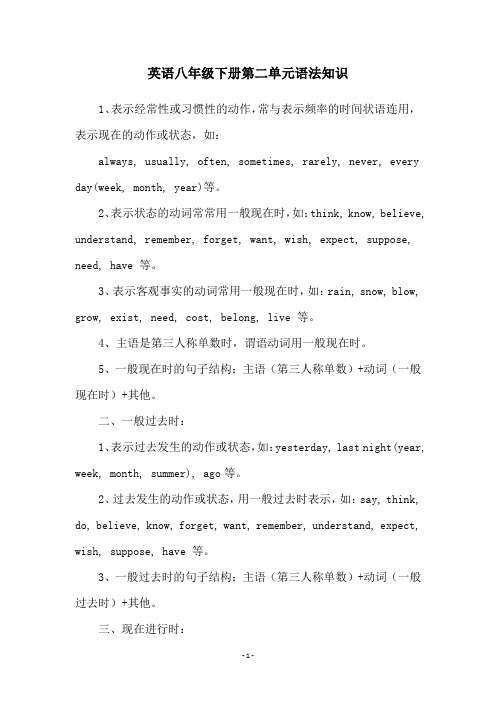
英语八年级下册第二单元语法知识1、表示经常性或习惯性的动作,常与表示频率的时间状语连用,表示现在的动作或状态,如:always, usually, often, sometimes, rarely, never, every day(week, month, year)等。
2、表示状态的动词常常用一般现在时,如:think, know, believe, understand, remember, forget, want, wish, expect, suppose, need, have 等。
3、表示客观事实的动词常用一般现在时,如:rain, snow, blow, grow, exist, need, cost, belong, live 等。
4、主语是第三人称单数时,谓语动词用一般现在时。
5、一般现在时的句子结构:主语(第三人称单数)+动词(一般现在时)+其他。
二、一般过去时:1、表示过去发生的动作或状态,如:yesterday, last night(year, week, month, summer), ago等。
2、过去发生的动作或状态,用一般过去时表示,如:say, think, do, believe, know, forget, want, remember, understand, expect, wish, suppose, have 等。
3、一般过去时的句子结构:主语(第三人称单数)+动词(一般过去时)+其他。
三、现在进行时:1、表示当前正在进行或发生的动作,如:now, at present, at the moment, still, look 等。
2、表示经常性的动作或一段持续的动作时,常用现在进行时,如:work, play, read, run, swim, stay 等。
3、现在进行时的句子结构:主语(第三人称单数)+ be 动词(am, is, are)+ 动词(现在分词)+ 其他。
初二下册英语语法归纳
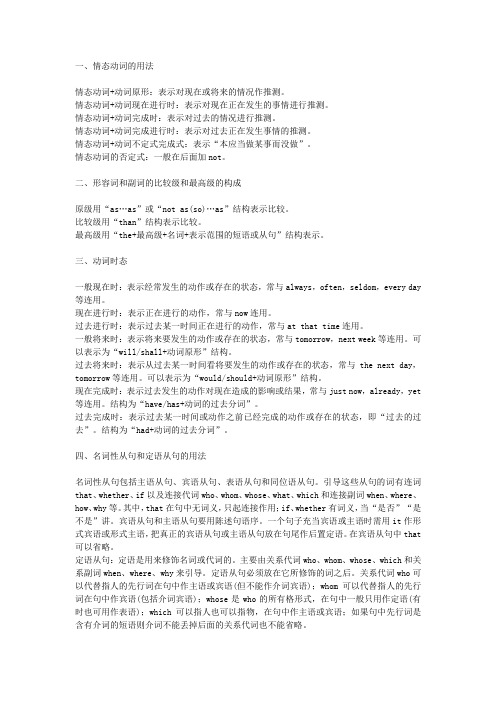
一、情态动词的用法情态动词+动词原形:表示对现在或将来的情况作推测。
情态动词+动词现在进行时:表示对现在正在发生的事情进行推测。
情态动词+动词完成时:表示对过去的情况进行推测。
情态动词+动词完成进行时:表示对过去正在发生事情的推测。
情态动词+动词不定式完成式:表示“本应当做某事而没做”。
情态动词的否定式:一般在后面加not。
二、形容词和副词的比较级和最高级的构成原级用“as…as”或“not as(so)…as”结构表示比较。
比较级用“than”结构表示比较。
最高级用“the+最高级+名词+表示范围的短语或从句”结构表示。
三、动词时态一般现在时:表示经常发生的动作或存在的状态,常与always,often,seldom,every day 等连用。
现在进行时:表示正在进行的动作,常与now连用。
过去进行时:表示过去某一时间正在进行的动作,常与at that time连用。
一般将来时:表示将来要发生的动作或存在的状态,常与tomorrow,next week等连用。
可以表示为“will/shall+动词原形”结构。
过去将来时:表示从过去某一时间看将要发生的动作或存在的状态,常与the next day,tomorrow等连用。
可以表示为“would/should+动词原形”结构。
现在完成时:表示过去发生的动作对现在造成的影响或结果,常与just now,already,yet 等连用。
结构为“have/has+动词的过去分词”。
过去完成时:表示过去某一时间或动作之前已经完成的动作或存在的状态,即“过去的过去”。
结构为“had+动词的过去分词”。
四、名词性从句和定语从句的用法名词性从句包括主语从句、宾语从句、表语从句和同位语从句。
引导这些从句的词有连词that、whether、if以及连接代词who、whom、whose、what、which和连接副词when、where、how、why等。
其中,that在句中无词义,只起连接作用;if、whether有词义,当“是否”“是不是”讲。
外研版八下英语复习笔记语法

外研版八下英语复习笔记语法集团档案编码:[YTTR-YTPT28-YTNTL98-UYTYNN08]四册笔记:M1语法:1.感官系动词五“起来”,形容词紧紧跟上来。
lookn._______v._______smell,n._______v._______tasten._______v._______ soundn._______v._______feeln._______v.________2.感官实义动词四看二听:see,watch,find,notice,hear,listento,接v原表示经常或过程,接ing表示正在。
M1,U11.Whatadelicioussmell!多香的味道。
感叹句:How+adj(+主谓)!What+a/an+adj+n(+主谓)!2.Wouldyouliketodosth=Doyouwanttodosth 你想要做某事吗?3.trysome/tryapiece/haveatry.尝一些,尝一块,尝一尝。
4.yes,please./No,thanks.(当别人主动提供你东西时的答语。
)5.What’sthatontop顶部是什么?6.I’mafraid+that从句/ofsth/todosth我恐怕…7.Itdoesn`tsmellfresh.感官动词借助于助动词来完成句型变化。
8.abitsour.有点酸。
abit+n=alittle+n/abit+adj=alittle+adj9.bedone(被)做完了10.inthemiddle.在中间11.makeanapplepie做个苹果馅饼12.haveasweettooth爱吃甜食13.ShallI/wedosth我、我们做某事好吗?14Areyousure+todosth/ofsth/that从句…你确定….吗?15.strawberryjam草莓酱16.Everythingtastessosweet!所有东西都尝起来这么甜。
最新北师大版英语八年级下册知识点汇总
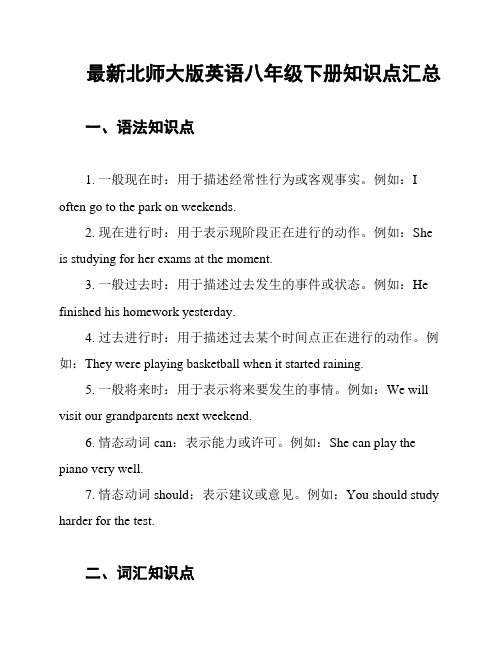
最新北师大版英语八年级下册知识点汇总一、语法知识点1. 一般现在时:用于描述经常性行为或客观事实。
例如:I often go to the park on weekends.2. 现在进行时:用于表示现阶段正在进行的动作。
例如:She is studying for her exams at the moment.3. 一般过去时:用于描述过去发生的事件或状态。
例如:He finished his homework yesterday.4. 过去进行时:用于描述过去某个时间点正在进行的动作。
例如:They were playing basketball when it started raining.5. 一般将来时:用于表示将来要发生的事情。
例如:We will visit our grandparents next weekend.6. 情态动词 can:表示能力或许可。
例如:She can play the piano very well.7. 情态动词 should:表示建议或意见。
例如:You should study harder for the test.二、词汇知识点1. 动物类词汇:例如cat(猫)、dog(狗)、elephant(大象)、tiger(老虎)等。
2. 学科类词汇:例如mathematics(数学)、science(科学)、history(历史)、English(英语)等。
3. 蔬菜类词汇:例如carrot(胡萝卜)、tomato(西红柿)、cabbage(卷心菜)、potato(土豆)等。
4. 家庭类词汇:例如father(父亲)、mother(母亲)、brother(兄弟)、sister(姐妹)等。
5. 地点类词汇:例如park(公园)、school(学校)、hospital (医院)、restaurant(餐厅)等。
三、阅读技巧1. 浏览标题和副标题,了解文章的大致内容。
人教版八年级英语下册重要语法知识点汇总

人教版八年级英语下册重要语法知识点汇总人教版八年级英语下册重要语法知识点汇总1. 否定句型1) 一般否定句I don't know this. No news is good news.There is no person (smoke)/not a person/not any person (smoke) in the house.2)特指否定He went to his office, not to see him.I am sorry for not coming on time.I don't think/believe/suppose/feel/imagine you are right.3)部分否定All the answers are not right//All is not gold that glittersI don't know all of them.//I can't see everybody/everything.Both of them are not right.4)全体否定None of my friends smoke.//I can see nothing/nobody.Neither of them is right.//Nothing can be so simple as this.5) 延续否定You didn't see him, neither/nor did I.You don't know, I don't know either.He doesn't know English, let alone/to say nothing of/not to speak of (更不用说) French.6) 半否定句We seldom/hardly/scarcely/barely hear such fine singing.I know little English. I saw few people.7) 双重否定You can't make something out of nothing.//What's done cannot be undone. There is no sweet without sweat.//No gain without pains.I can't help /keep/ laughing whenever I hear it.No man is so old but (that) he can learn.8)排除否定Everyone is ready except you.//He did nothing but play.But for your help, I couldn't do it.9)加强否定I won't do it at all.//I can't see it any more.//He is no longer a boy.2. 判断句型1) 一般判断句It is important for us to learn English.It is kind of you to help me sincere means honest.The boy is called/named Tom.We regarded/consider it as an honor.2)强调判断It is English that we should learn.//It is he who helped me a lot.3)弱式判断Your sentence doesn't sound/look/appear/feel right.You look/seem as if/as thought you had been there before.Maybe/Perhaps/ she is ill.He is probably ill.//He is likely ill. //It is possible that he is late 4) 注释判断He can remember so many English words, that is (to say) he is a living dictionary.(活字典)5) 正反判断That sounds all right, but in fact it is not.6) 比较判断It is more a picture than a poem.7) 互斥判断He or you are wrong. Either he is right or I am.3. 祝愿祁使句式1) 一般句式Study hard and keep fit. Be brave! Don't be shy! Get out of here.2)强语式Do tell me. Never tell a lie.3) 委婉祈使句Please tell me the true. Would/Will/Won't do me a favor?Would/Do you mind my smoking? What/How/ about going on foot?4)建议祈使句Let us go. Let us know the time. Don't let the fire out.Let's not waste the time. You'd better start early.Shall we listen to some music? Why don't you get something to drink? Suppose/supposing you pick me up at about six?I suggest we (should) take the train.5)祝愿句Success to you! //Wish you a good journey.May you have a happy marriage. //Here's to your success!Allow me to propose a toast to our friendship!4. 感叹句型How well he speaks! //How kind she is! //What a nice weather it is! Here he comes! //Such is life! //Wonderful! // Help!5. 疑问句型1) 一般疑问句Is he a doctor?//Do you the way to the station?2)反意疑问句He is a teacher, isn't he?//It is quite cheap, don't you think?3) 特殊疑问句What is the distance/width/size/population/temperature/fare?Who is he? What is he?(干什么的)//What is he like? // How is he? How do you like him? //What do you think of him?What ever do you mean by saying this?4)选择疑问句He is a doctor or a nurse?5)间接疑问句Do you know how old he is? //Tell me if (whether) you like it.What do you think/say/suppose I should do?6. 数词句型1) 表数目It is exactly ten o'clock.//It is five miles away from here.He is more than/over/ at least not less than 20.He is under/at most/no more than 20.2)表年月日He was born on April 22 1994/in 1994 on the morning of Oct.1.3)表年龄He is 20 years old/years of age.//He is at the age of 10.4)表倍数It is four times that of last years.This is four times as big (again) as that one.This is four times bigger than that one.The income is double what it was.The output of coal was 200% greater than in 1998.5)表计量It is 10 meters long/wide/high.//It costs me 100 yuan.I spent 10 hours to finish it.//It took me 10 days to finish it.It is worth 100 yuan.7. 关联指代句型1)两项关连I have two books, one is Chinese; the other English.I have five books, one is Chinese; the others English.To say is one thing, but/and/ to do is another.One the one hand, I am your teacher, and on the other hand, I am also you friend.Some like to play football, others are fond of basketball.2)先后顺序First/firstly, I wish good health, second/secondly success in your study, third/thirdly good luck in everything.First stop, then look, finally cross.At first/in the beginning/ he word hard. Later/Afterwards he is not so diligent.3)修饰限制This is the same book as I lost yesterday.This is the same book that I lost yesterday.(同一本书)Don't trust such a man as over praise you.He/One/Those/They who should come failed to appear.A man/A person/The one/Anyone/People who saw her liked her very much.The day/time/moment will come when China is strongest in the world.4) 两项连接He can speak not only English but also French.The book is both interesting and instructive.It is neither cold nor hot.Please either come in or go out.The old worker has experience and knowledge as well.5)加和关系Besides literature, we have grammar and writing.Apart from oxygen, there are some other gases in the air.In addition to "if", there is many other conjunctions that can introduce conditional clauses.I must go now, incidentally, if you want that book.You seem to like tea, so do I.8. 比较句型1)等比句He is as tall as I. // He is the same height as I.She is no less diligent than he. The lab is no better than a cottage.2) 差比句I speak English worse than he does.//He is not so/as tall as I am.Our knowledge is much inferior to their.3) 极比句He is the tallest of all in the class.None/No one/ is so blind as those that won't see.Nothing is so easy as this.4)比例句The more a man knows, the more he feels his ignorance(无知).5) 择比句He is taller than any other boy in the classIt is better late than never.//They would die than live as slavesHe prefers doing to talking//He prefers to do rather than to talk.He prefers mathematics to English.//I'd rather stay here.6)对比句You think me idle, but on the contrary, I am busy.They are working hard while you are wasting your time.9. 比喻句型We must work like him.//He behaves as his father does.He speaks English as if/though he was a foreigner.10. 条件假设句1) 一般事实If we succeed, what will the people say?Suppose it rains, what shall we do?Persevere(坚持) and you'll succeed.2)虚拟条件句If I were you, I would go.//If you had seen it, you would have been moved.3)反条件句Unless you try, you'll never succeed.//Don't move, or/else/otherwise I'll shot.4)唯一条件句If only I have another chance, I shall do better.Only in this way can we learn English well.So/As long as we don't lose heart, we'll succeed.5)推论条件句Since that is so, there is no more to say.Now that you are grown up, you must stop this behavior.11. 时间句型1)一般时When I see him, I'll tell him.2) 表同时You'll grow wiser as you grow older.Work while you work, play while you play.He worked, at the same/in the meantime he listened to the music.3)限制时Every/each time when I went to his house, he was out.By the time that we got there, he was out.4)交替时Sometimes he sings, sometimes he dances.At one time the baby cries, at another it talks.5)先时I stopped hem before he began to talk with me.6)后时I'll tell you after I finish it.7)紧接时As soon as I see him, I'll tell him.Once you begin, you must continue.The (very) moment/instant (that) I saw him, I recognized him. On hearing the news, she bust into tears.Hardly had I seen the light, when I heard a loud thundering.8)延续时I haven't seen him since I came here.A friend is never know till/until a man have need.12. 地点句型1) 一般地点Where have you been?Where there is a will, there is a way.2)方位Hebei lies in the east of China.Japan is lies to the east of China.The house faces (to) the south.He is sitting at the front of the classroomHe is standing in front of/before me.He is sitting at the back of/behind me.He is sitting in the back of/at the rear of the classroom. He is sitting next to/besides me.He is sitting close to/near me.At the top of/On top of the shelf, there are some books.He is sitting on the left/right.The mountain you see to the right is the Purple Mountain. 13. 原因句型He didn't go to school because he was ill.Since we are all here, let's begin our meeting.It might rain yesterday, for the ground was wet.Now (that) we have finished the work, we can go home.I am glad to meet you.I am sorry that I hear that.Thank you for your help.That is why he failed to come.He didn't come because of/on account of the weather.He went out of curiosity.I succeeded thanks to his help.This failure is due to the fact they lack experience.Owing to our joint efforts, the task was fulfilled.What are studying English for?For what reason did you choose this?What's the point of asking his to do that?How come you never told me about it?What with the wind and what with the rain, our walk was spoiled.14. 目的句型He stopped aside so that she could go in.He sits in the front in order that he can see words clearly.He gets up early so as to/in order to have time to do exercises. He repeated it for fear that there should be any mistake.15. 结果句型It was very cold, so that the river froze.They cost a lot of money, so/therefore we use them carefully. He is such a good man that every one likes him.He ran so fast that no one could catch him.He hurried to the house only to find that it was empty.I was caught in the rain. As a result, I had a bad cold.16. 程度句型How often do you write to your parents?How long do you stay at home?It is so beautiful that we all love it.It is too big for you.He is too excited to speak.He is not old enough to know this.The letter must be sent as soon as possibleYou must work as hard as you can.As far as I know, I can speak only English.17. 让步句型Though/Although he is rich, (yet/still) he doesn't show off.Yang as he is, he know a lot of things.Even if/though he succeeded, he was not proud.No matter what you say, I'll still try to do it.Keep calm, whatever happens.In spite of this, we must go ahead with our plans.Regardless of all the difficulties, we'll fight it out to the end.18. 转折句型I searched everywhere but could not find him.You may go, only return quickly.He is seriously ill, still there is hope of his recovery.It looked like rain, however it was clear in the afternoon.He is still young, yet he is high up in the position.He didn't tell me the truth, I know it, though.19. 省略句I think/say/suppose/expect/believe/hope so.Why not come earlier next time?。
八年级下册英语知识点归纳总结

八年级下册英语知识点归纳总结一. 语法知识点1. 过去进行时过去进行时用于描述过去某个时间点或时间段正在进行的动作或情况,常与时间状语连用。
例如:- I was reading a book at this time yesterday.(昨天这个时间我正在看书。
)- They were playing basketball when it started raining.(下雨时他们正在打篮球。
)2. 一般将来时一般将来时用于表示将来某个时间点或时间段要发生的动作或情况。
例如:- I will visit my grandparents next weekend.(我下周末会去看望我的祖父母。
)- She is going to travel around the world after graduation.(毕业后她打算周游世界。
)3. 动词不定式动词不定式用于表示动作的目的、原因、结果或意图。
例如:- She needs to finish her homework before she can go out to play.(她需要先完成家庭作业才能出去玩。
)- I want to buy a new bike.(我想买一辆新自行车。
)4. 形容词比较级和最高级形容词比较级用于比较两者的大小、程度或数量;最高级用于比较三者或三者以上的大小、程度或数量。
例如:- The weather is getting colder and colder.(天气变得越来越冷了。
)- He is the tallest boy in our class.(他是我们班最高的男孩。
)5. 定语从句定语从句用于修饰名词或代词,用来说明或限定名词或代词的情况。
例如:- The girl who is wearing a red dress is my sister.(穿红色连衣裙的女孩是我的妹妹。
)- I know the man whose car was stolen.(我认识那辆车被偷的人。
八年级下册英语unit3语法笔记

八年级下册英语unit3语法笔记English:In Unit 3 of the eighth-grade English textbook, students will encounter various grammar points essential for their language development. One key grammar concept covered in this unit is the past continuous tense. Through exercises and examples, students learn how to form and use this tense to describe ongoing actions or events in the past. They understand that it's constructed using the past tense of the verb "to be" (was/were) followed by the present participle (the base form of the verb + ing). Additionally, students explore the use of time expressions such as "while," "when," and "as" to indicate the duration or simultaneous occurrence of actions in the past. Furthermore, this unit delves into the formation and usage of reported speech, also known as indirect speech. Students learn how to convey what someone else has said without quoting them directly, understanding the shifts in pronouns, tense, and word order that occur in reported statements. Moreover, they grasp the importance of accurately conveying the original speaker's message while adjusting the reporting verb and pronouns accordingly. Furthermore, Unit 3 introduces students to modal verbs, such as "can," "could,""may," and "might," and their various functions in expressing possibility, ability, permission, and obligation. By understanding the nuances of modal verbs, students can articulate ideas with greater precision and flexibility in different contexts. Overall, Unit 3 provides students with a comprehensive understanding of these grammar structures, enabling them to communicate effectively and confidently in English.Translated content:八年级英语教材第三单元涵盖了对学生语言发展至关重要的各种语法要点。
人教版初中英语八年级下册语法知识点
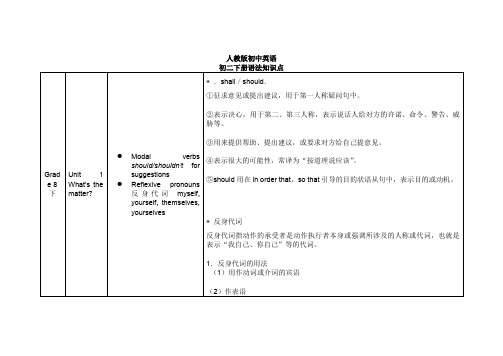
4.动词+副词+介词(其后需加宾语)
5.动词+名词(其后不加宾语)
make a bed整理床铺take place发生make faces做鬼脸
6.动词+名词+介词(其后需加宾语)
It is very kind of you to help me.=You are very kind to help me.你帮我的忙,太谢谢你了。
5.疑问词和不定式连用和疑问词连用的不定式在句中相当于名词,常作主语、宾语、表语、同位语等。
6.省略to的不定式
(1)当两个(或两个以上的)不定式由and,or,than等连接时,通常只需在第一个不定式前用to,其余不定式前的to可省略。
4)当某些结构后的不定式动作与句中某一动作重复时,不定式符号to之后的其他成分可以省略,只保留不定式符号to。常见结构有:be able to,be going to,have to,ought to,used to等。
8.不定式的主动表示被动
①在“be+性质形容词+不定式”结构中。
此类形容词有easy,hard,difficult,interesting,heavy,pleasant,comfortable,safe,dangerous,impossible等。
4.不定式的复合结构不定式用for和of引出逻辑主语,带有逻辑主语的不定式称为不定式的复合结构。不定式的复合结构在句中可作主语、宾语、定语等。
当作表语的形容词表示人的性格、品质时,常用of引出不定式的逻辑主语,否则用for引出。常见的表示性格、品质的形容词有:
good好的kind和蔼的brave勇敢的honest诚实的lazy懒惰的nice好的wise明智的clever聪明的silly傻的stupid笨的foolish愚蠢的right正确的wrong错的rude粗鲁的polite礼貌的fair公正的unfair不公正的careless粗心的careful细心的patient耐心的
- 1、下载文档前请自行甄别文档内容的完整性,平台不提供额外的编辑、内容补充、找答案等附加服务。
- 2、"仅部分预览"的文档,不可在线预览部分如存在完整性等问题,可反馈申请退款(可完整预览的文档不适用该条件!)。
- 3、如文档侵犯您的权益,请联系客服反馈,我们会尽快为您处理(人工客服工作时间:9:00-18:30)。
八年级下册英语语法笔记Unit 1语法本单元主要学习将来时态的表达1.将来时态:表示将要在将来的时间里发生的动作。
主要的时间状语有in the future , tomorrow,the day after tomorrow, next day(month, year), in +段时间表示的将来时间,如:in ten years, in two weeks等.将来时的肯定构成:主语+will+V原+其他I will go to Beijing tomorrow.原+其他I won’t go to Beijing tomorrow.将来时的否定构成:主语+will+not (won’t )+V将来时的疑问构成:Will +主语+V原+其他?Will you go to Beijing tomorrow?Yes, I will. No, I won’t.在英语中也可以用另外一种句子表示将来时肯定构成:主语+be going to + V原+其他. I am going to Beijing tomorrow.否定构成:主语+be going to + V原+其他. I am not going to Beijing tomorrow.疑问构成:Be+主语+ going to + V原+其他?Are you going to Beijing?Yes, I am No, I am not.两者的区别主要是:1)be going to 表示有某种暗示Eg:It is going to rain.(通过看天气或云而判断出来的。
)2)be going to 有计划性,有某种打算I am going to be a teacher.除了以上之外,will 和be going to 可以通用。
2.There be 句型表示“有”,have 也表示“有”,那么“将要有”的表达如下:①There is going to be ②there will be③主语(必须是人做主语)+will have ④主语(必须是人做主语)+ be going to haveThere is going to be a sports meeting next week.= There will be a sports meeting next week.I will have a new toy car. = I am going to have a toy car.没有there is going to have , there will have 的表达。
3.不定代词:表示没有具体指代的人或物。
表示物的不定代词everything, something, anything, nothing不定代词表示人的不定代词everybody(everyone),somebody(some one),anybody(any one),nobody(no one)注意:所有的不定代词没有复数形式,只有单数形式。
Everyone stays (stay) at home.4.a little, little, a few, few的区别及用法a little 一点 a few后面必须加不可数名词后面必须加不可数名词little 几乎没有 a littleeg: He is new, so he has few friends.eg: I am so thirsty, but there is little water in the glass.little —less —least few—fewer—fewest5.free 自由的adj I will be free tomorrow.免费的adj Everything is free, you needn’t take money.n. freedom 自由6.polution污染n.(不可数名词)There is much pollution in the city.7. agree : v 同意agree with sb. 同意某人I agree with you.agree —disagree= don’t agree-在人们的家里①there will be 将要有②in people’s homes③study at home on computers 在家通过电脑学习活到…⑥in 100 years 一百年以后⑦less pollution 更少的污染④be free 免费⑤live to be… ⑧big and crowded 大而拥挤⑨more tall buildings 更多的高大建筑物8.alone, lonelyalone, 独自一人强调一个人lonely, 孤独的;寂寞的强调内心的孤独,寂寞I live alone, but I don’t feel lonely.9. keep: v. 饲养I like keeping pets.v. 使某人… keep (sb.) doing sth I keep him waiting.保持keep sth + adj Please keep the room clean. Keep quiet.10. can / be able to 区别共同点:含义相同能够不同点:can 是情态动词,只有一般现在时态和过去时态be able to 可用于各种时态,be动词随主语的不同要做相应的变化。
He can play soccer.= He is able to play soccer.11. need: 双重身份的动词1)情态动词+V原I need a new bike.2)行为动词need to do sth I need to buy a new bike. 12. Predicting the future can be difficult. Predicting 在这里是动名词做主语。
动名词虽然是名词,但是也具有动词性质,表示动作,但是名词就没有动作性质。
predict v 预测n. prediction n. 预测,预言13.One of + 名词复数+动词单数+其他….的之一He is one of the best students. 他是最好的学生之一。
14.be used by 被用于…. The bike is used by riding.15.see sb doing sth 看见某人正在做某事I see him playing soccer.see sb do sth 看见某人做了某事I saw him play soccer.在Section B 中必须掌握的短语①fell in love with 爱上②as a reporter 作为一个记者③living alone 独自一人居住④on the weekend 在周末⑤one day 一天⑥World Cup 世界杯⑦for fun 为了娱乐⑧from now 从现在⑨work for sb 为某人工作⑩job interview 工作面试⑾fly to 飞向…⑿come true 实现16. help: help sb do sth =help sb with doing sth =help sb with sthHe helps me clean the room.=He helps me with cleaning the room.17. such\ so 表示“如此”时的区别such a\an + adj. + 单数名词He is such a clever boy.so +adj.+a\an +单数名词= He is so clever a boy.18.try try to do sth 努力做某事I try to listen him carefully.try doing 尝试做某事尽某人最大努力做某事try one’s best to do sthI try my best to help her. 我尽我最大努力帮助她。
19.the same …..as 同… 一样He has the same pen as me.(注意same前面的the 永远不可以丢掉。
)20.make v make sb do sth 使某人做某事Playing games make me be happy.make sb +adj 使某人….= Playing games make me happy.21.It is +adj for sb. to do sth. 对于某人来说做某事是adj.It is important for us to be healthy.It is easy for a child to wake up.- 22.seem: v. 似乎1)seem to do sth He seems to be wrong.It seems that he is wrong.2) It seems(seemed) that +….23. over and over again 再三地They do simple jobs over and over again.Unit2语法本单元主要学习表示建议的句子1.should 情态动词肯定形式:主语+should +动词原形否定形式:主语+should +not+动词原形疑问形式:Should +主语+动词原形?Yes, 主语+should. No, 主语+shouldn’t.2. want: want to do sth. want sb.to do sth want +n.3.enough: adj. 足够的enough+n.或n.+enough I have enough money.= I have money enough.adv. 足够地adj.+ enough (切记enough 修饰形容词只能放在后面)He is old enough.enough +n. to do sth / adj+enough to do sthEg:I have enough books to read. He is old enough to go to school.4.argue v. 争吵argue with sb. 和某人争吵He always argues with his friends.argue about sth 争吵某事They are arguing about the math test.n. argument They had a big argument.5. out of style 过时的= old-fashioned My clothes are out of style.不过时的in style怎么了?=What’s the matter?=What’s the trouble?6. What’s wrong?7. write him a letter 给他写一封信= write a letter to him8. call sb up 给某人打电话Please call me up when you are free.call sb at+电话号码Please call her at 88171858.9. give him a ticket to a ball game 给他一张球赛的票注意这里的介词用to, 类似的搭配还有:the answer to the question, the key to the door.10.surprise: n.惊讶to one’s surprise 使某人惊讶的是To my surprise ,he passed the math test.in surprise 惊讶地He looked at me in surprise.v. surprise at sth 对…感到惊讶He surprised at the toy car.surprise sb 使某人惊讶I don’t want to surprise him.adj. surprising(主语是物) / surprised (主语是人)11.talk about sth 谈论某事talk to\with sb. 和某人谈话12. 1)pay for 支付;花费(金钱)主语必须是人spend ....(in) doing sth2)spend:花费(时间或金钱)主语必须是人spend ….on sth3)cost: 花费(时间或金钱)主语必须是物4)take: 花费(时间或金钱)只能用it 做主语,公式是:It takes(took) sb. some time(money) to do sth.用口诀记住四个表示“花费”的单词:2人1物1 it.①I paid ten yuan for the book.②I spent ten yuan in buying the book.\ I spent ten yuan on the book我花10元钱买了这本书。
